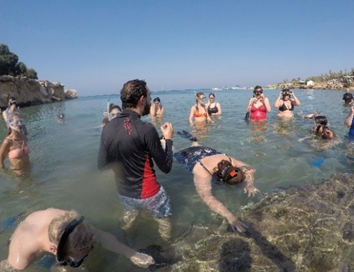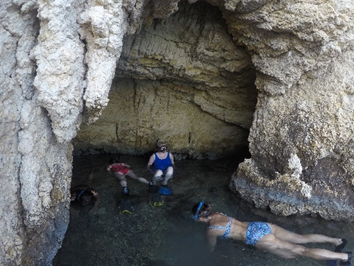Day 3 was spent in Famagusta Province where qualified teachers working at the Unit of Education for the environment and Sustainable Development (Cyprus Ministry of Education, Youth and Sport) offered several activities. Indoor activities took place at Cape Greco Environmental Education Centre and outdoor activities were organized at Malama Beach in Paralimni (Protaras), where methods and practices for learning and teaching and policy for promoting sustainability were presented via indoor and outdoor activities and at plenary sessions.
-
Visit to the Observatory of Ammochostos – the abandoned town
Participants visited the Cultural Centre of Occupied Famagusta built on the demarcation line near the Street Barricade of Deryneia. There, they watched a video about Famagusta, which is occupied by the Turkish army since 1974, and part of it is completely abandoned/closed since then. They had the opportunity to observe the occupied town from a distance and they discussed with the Cultural Centre officer on the situation in the occupied part of Cyprus, the events and actions that had preceded the Turkish invasion and the difficulties/obstacles in finding a sustainable solution to the Cyprus problem.



-
Activities at the Cape Greco Environmental Education Centre
Efi Dareiou, Kyriakos Kefalas, Nicolas Papanicolas, Simoni | Unit for the Education for Environment and Sustainable Development (Cyprus)
Firstly, participants were briefly informed about the Environmental Education Center Network in Cyprus. Then they were separated in two groups and participated in the following activities (in turn):
Marine oil spill management
An activity simulating an oil spill and investigating how to manage marine pollution from an oil spill using basins of water, olive oil and plastic pipes that simulate oil spill containment rings. Participants observed how the oil adheres to the stone that simulates the shores and discussed the impact of wind and waves. They attempted to collect the oil using a dropper and discussed the importance of quick action to prevent the spread of the oil spill and its arrival on the coasts.
Public consultation on “Pass legislation to reduce greenhouse gas emissions to achieve Climate Neutrality by 2050”
Participants experienced a role-playing game that aimed to highlight the complexity of global problems such as climate change and the difficulties that exist in imposing mitigation and adaptation measures to ensure sustainability, through exploring different perspectives of the actors involved. The issue presented is real, while the scenario was made up of measures recently imposed in various European countries. That is, it was fictional with many doses of truth. Participants were divided into groups and were given different roles (e.g., climate change experts, automotive industries, renewable energy companies, farmers) and prepared arguments to accept, amend or reject the legislation.Exhibits of the small natural history museum
Participants had a short, guided tour to the small natural history museum located at the Cape Greco Centre.



-
Field work Activities at Malama (Skoutarospilioi) Beach: Mediterranean Sea calls SOS (Marine Biodiversity – Marine Pollution)
Constantinos Phanis, George Fyttis | Unit for the Education for Environment and Sustainable Development (Cyprus Ministry of Education, Sport and Youth)
Field work activities were organized to study human influences on the marine environment and stress the stress the importance of protecting marine ecosystems. Participants were divided into two groups and took part in several field activities in turn, so everyone had the opportunity to participate in all activities.
The first group of participants was divided into smaller groups and worked collaboratively. For each small group there was a leader who was responsible for asking the questions and writing down the group's answers and ideas in writing. Activities covered the following topics:
Microplastic pollution in sand and seawater and their impact on organisms
Participants were asked to list arguments regarding the necessity to convince a school to organize a debate on the impact of plastics on marine ecosystems. Also, they outlined how biotic and abiotic factors affect the distribution of organisms on a rocky shore. They drew a terrestrial and an aquatic food web that they observed at Skoutarospilioi Beach and outlined the impact of microplastics on the ecosystem.
Understanding climate change effects on the marine ecosystem of Skoutarospilioi Beach
Participants used the iNaturalist App to identify the rocky shore ecosystem of Skoutarospilioi beach (terrestrial organisms, aquatic organisms), they described the adaptations of some of the organisms and they discussed the benefits of contributing to the citizen science platform iNaturalist as identifiers.
Tourism
Participants suggested a sustainable resource activity at Skoutarospilioi beach that we can continue to use or carry out at the current rate, without causing damage to the environment, and without the resource running out. They also discussed the positive impacts of Education for Ecotourism and Sustainability
The second group of participants used masks and flippers and made a snorkel survey.
Snorkel survey of the marine environment
Participants discussed ways of investigating the population size and species richness (the number of species within a defined region) by random sampling using quadrats and they tried to locate and identify species (invasive or endemic) such as the Lionfish and the Red Sea goatfish, or the Rainbow wrasse and Posidonia oceanica (Sea grass). Also, participants discussed the importance of Posidonia oceanica plant species and ways of investigating important aspects such as the increasing temperature and decreasing pH, the increase in sea level and extreme weather, the loss of habitat and land, the coral bleaching etc.
After the marine field-work activities, participants were asked to respond to a Quiz on the content of the activities.





